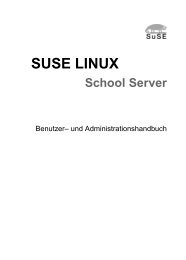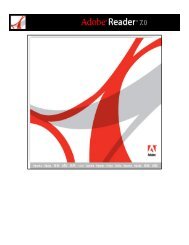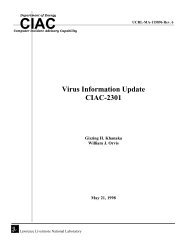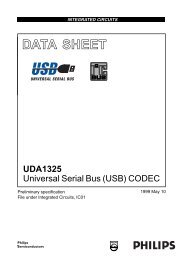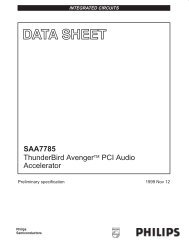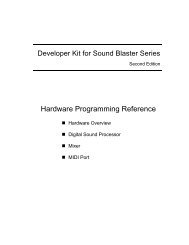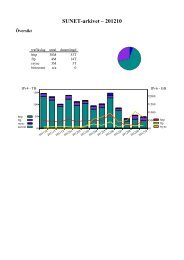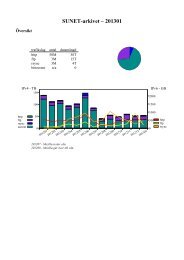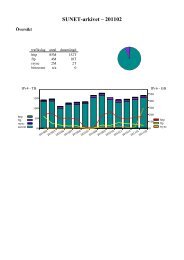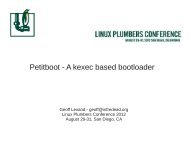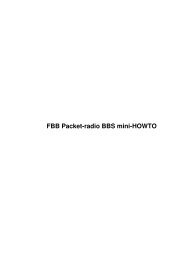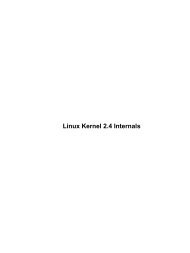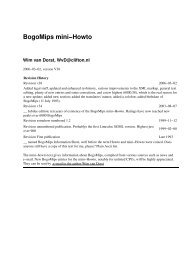Linux IP Masquerade HOWTO - The Linux Documentation Project
Linux IP Masquerade HOWTO - The Linux Documentation Project
Linux IP Masquerade HOWTO - The Linux Documentation Project
You also want an ePaper? Increase the reach of your titles
YUMPU automatically turns print PDFs into web optimized ePapers that Google loves.
<strong>IP</strong>TABLES for the 2.4.x kernels much like there was <strong>IP</strong>CHAINS for the 2.2.x kernels and<br />
<strong>IP</strong>FWADM for the 2.0.x kernels. <strong>The</strong> new <strong>IP</strong>TABLES system is far more powerful (combines several<br />
functions into one place like true NAT functionality), offers better security (stateful inspection), and<br />
better performance with the new 2.4.x TCP/<strong>IP</strong> stack. But this new suite of tools can be a bit<br />
complicated in comparison to older generation kernels. Hopefully, if you follow along with this<br />
<strong>HOWTO</strong> carefully, setting up <strong>IP</strong>MASQ won't be too bad. If you find anything unclear, downright<br />
wrong, etc. please email David about it.<br />
Unlike the migration to <strong>IP</strong>CHAINS from <strong>IP</strong>FWADM, the new NetFilter tool has kernel modules that<br />
can actually support older <strong>IP</strong>CHAINS and <strong>IP</strong>FWADM rulesets with minimal changes. So re−writing<br />
your old MASQ or firewall ruleset scripts is not longer required. BUT.. with the 2.4.x kernels, you<br />
cannot use the old 2.2.x MASQ modules like ip_masq_ftp, ip_masq_irc, etc. AND <strong>IP</strong>CHAINS is<br />
incompatible with the new <strong>IP</strong>TABLES modules like ip_conntrack_ftp, etc. So, what does this mean?<br />
It basically means that if you want to use <strong>IP</strong>MASQ or PORTFW functionality under a 2.4.x kernel,<br />
you shouldn't use <strong>IP</strong>CHAINS rules but <strong>IP</strong>TABLES ones instead. Please also keep in mind that there<br />
might be several benefits in performing a full ruleset re−write to take advantage of the newer<br />
<strong>IP</strong>TABLES features like stateful tracking, etc. but that is dependant upon how much time you have to<br />
migrate your old rulesets. Please see Section 7.40 for additional details.<br />
Some new 2.4.x functionalities include the following:<br />
PROs:<br />
CONs:<br />
<strong>Linux</strong> <strong>IP</strong> <strong>Masquerade</strong> <strong>HOWTO</strong><br />
• Lots of new protocols modules like: amanda, eggdrop, ipsec, ipv6, portscan, pptp, quota, rsh, talk, and<br />
tftp<br />
• TRUE 1:1 NAT functionality for those who have TCP/<strong>IP</strong> addresses and subnets to use (no more<br />
iproute2 commands)<br />
• Stateful application level (FTP, IRC, etc.) and stateful protocol level (TCP/UDP/ICMP) network<br />
traffic inspection<br />
• Built−in PORT Forwarding (no more ipmasqadm or ipportfw commands)<br />
• <strong>The</strong> built−in PORTFW'ing support works for both external and internal traffic. This means that users<br />
that have PORTFW for external traffic and REDIR for internal port redirection do not need to use two<br />
tools any more!<br />
• PORT Forwarding of FTP traffic to internal hosts is now completely supported and is handled in the<br />
conn_trak_ftp module<br />
• Full Policy−Based routing features (source−based TCP/<strong>IP</strong> address routing)<br />
• Compatibility with <strong>Linux</strong>'s FastRoute feature for significantly faster packet forwarding (a.k.a <strong>Linux</strong><br />
network switching).<br />
Note that this feature is still not compatible with packet filtering for strong firewall rulesets.<br />
• Fully supports TCP/<strong>IP</strong> v4, v6, and even DECnet (ack!)<br />
• Supports wildcard interface names like "ppp*" for serial interfaces like ppp0, ppp1, etc<br />
• Supports filtering on both input and output INTERFACES (not just <strong>IP</strong> addresses)<br />
• Source Ethernet MAC filtering<br />
• Denial of Service (DoS) packet rate limiting<br />
• Packet REJECTs now have user−selectable return ICMP messages<br />
• Variable levels of logging (different packets can go to different SYSLOG levels)<br />
• Other features like traffic mirroring, securing traffic per login, etc.<br />
Chapter 2. Background Knowledge 7



